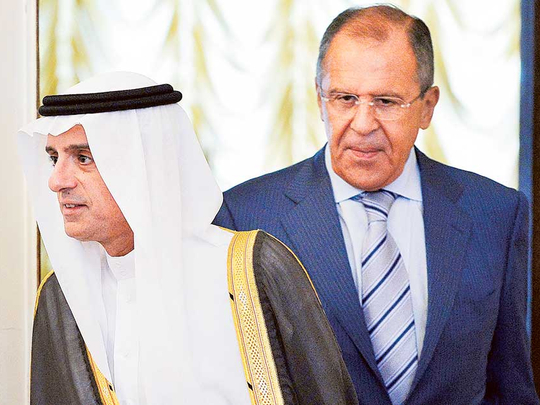
Moscow: Pressing to mediate the Syrian conflict, Russia on Tuesday hosted the Saudi foreign minister for talks that revealed sharp differences about the fate of Syrian President Bashar Al Assad.
Russian Foreign Minister Sergey Lavrov pushed for engaging Syrian government forces in international efforts to fight Daesh terrorists, but his Saudi counterpart, Adel Al Jubeir, firmly rejected any role for Al Assad.
“We believe that Al Assad is part of the problem and not part of the solution,” he said.
The two did, however, agree on the need to encourage Syrian opposition groups to pool their efforts in the search for peaceful settlement.
Their meeting follows Russian-Saudi talks last week in Qatar that also involved US Secretary of State John Kerry. Later this week, Lavrov is set to confer with the opposition Syrian National Coalition, which until now has refused to visit Russia.
As part of its diplomatic blitz, Moscow is also expected to host a deputy UN envoy for Syria and the Iranian foreign minister.
Moscow has been a key backer of Al Assad, shielding his regime from UN sanctions and providing it with weapons throughout a civil war that has dragged on for more than four years, leaving at least 250,000 dead and turning more than four million people into refugees.
President Vladimir Putin launched Russia’s new mediation effort in June, meeting with Saudi Deputy Crown Prince and Defence Minister Mohammad Bin Salman Bin Abdul Aziz in St Petersburg.
While details of Putin’s plan haven’t been made public, Lavrov said Russia proposes that all anti-Daesh forces, including the Syrian army, the Iraqi army and the Kurds, pool their efforts.
“They all must be united, and the regional players must use their influence with the groups on the ground to make such unification as efficient as possible,” Lavrov said.
“Without pooling efforts of all those who confront terrorists on the ground, the US-led coalition’s air strikes wouldn’t bring the desired results and Daesh wouldn’t be defeated,” Lavrov said. However, he said Russia was not proposing a unified command.
Lavrov strongly warned trying to unseat Al Assad, which is the longtime goal of Syrian rebels along with Saudi Arabia and Turkey.
“Bashar Al Assad isn’t threatening any neighbouring country, while [Daesh] has ... compiled maps ranging from Spain to Pakistan,” he said.
Al Jubeir insisted that the Saudi stance on the Syrian conflict has remained unchanged, adding that while the Syrian military and other government structures should be preserved, Al Assad should have no role in a future Syria.
On a conciliatory note, he said he and Lavrov agreed on the importance of uniting the Syrian opposition so that they go united to the peace process. “Terrorism threatens the whole world and we discussed ways of confronting it,” Al Jubeir said.
He added that Saudi Arabia is also considering the purchase of Russia’s Iskander missiles and other weapons systems.












